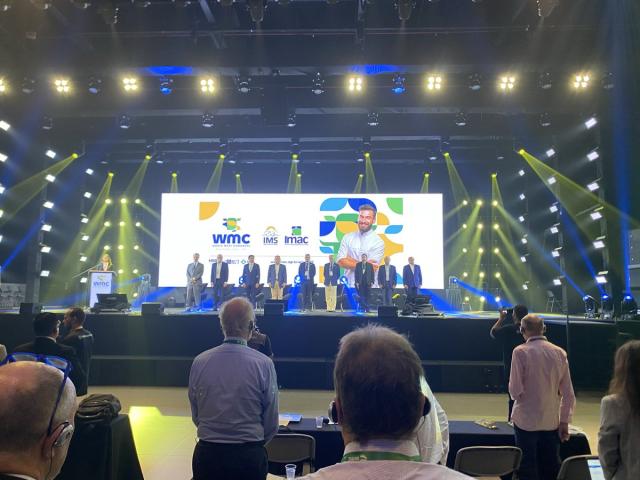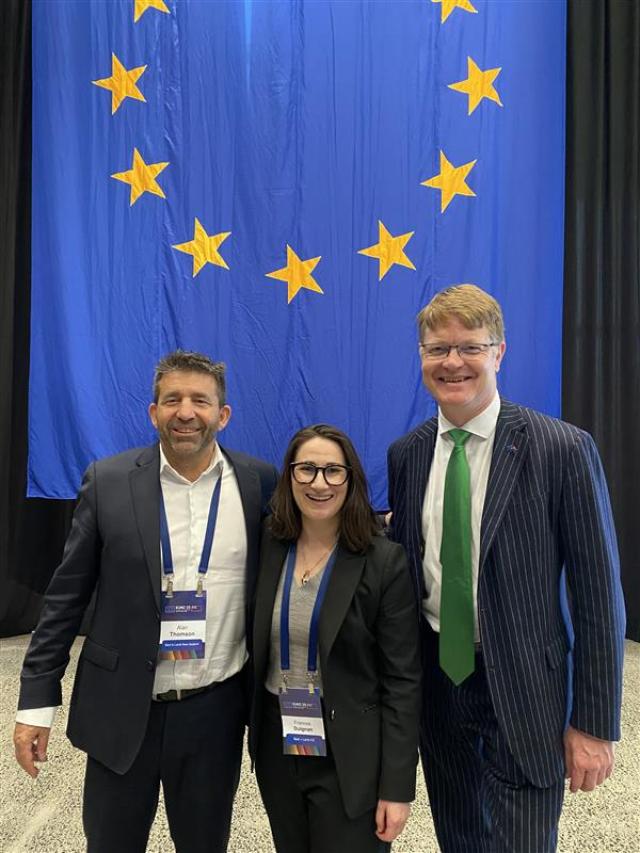Beef + Lamb New Zealand (B+LNZ) chief executive Alan Thomson and Director UK and EU Macaulay Jones have recently returned from the World Meat Congress (WMC) in Brazil, where global meat industry leaders came together to discuss shared challenges on a range of issues from climate change and sustainability to trade access and biosecurity.

Alan spoke on a panel moderated by Erin Borror, vice president of the US Meat Export Federation, alongside Ruper Claxton of Gira Meat and Livestock, Thanawat Tiesin of the UN’s Food and Agriculture Organization (FAO), and Knud Buhl, CEO of the Danish Bacon & Meat Council.
The Congress reinforced New Zealand’s leadership role in promoting science-based climate policy and rules-based trade.
A key achievement from the Congress was a joint international statement, led by B+LNZ and the United Kingdom’s National Famer’s Union (NFU), urging countries to adopt a split-gas approach to greenhouse gas (GHG) reporting. More than 30 organisations across 14 countries (including Federated Farmers and DairyNZ), as well as several multinational groups, signed the statement, marking a landmark step toward more accurate and fair global climate policy . The statement can be accessed here.
“The World Meat Congress was a great opportunity to engage directly with our international counterparts,” says Alan.
“New Zealand has led the way in recognising the different warming effects of short- and long-lived gases. Through this joint statement, we’ve helped secure global backing for that principle.”
Trade was another major theme. A key focus was China’s ongoing beef safeguard investigation.
“Safeguard measures are the most restrictive form of trade remedy and should only be used in exceptional circumstances, where all relevant criteria are fully satisfied,” says Alan.
“New Zealand exports do not harm China’s domestic beef industry and therefore should be exempt.”
B+LNZ also worked to build a consensus on Japan increasing its beef safeguard volumes under the Comprehensive and Progressive Agreement for Trans-Pacific Partnership (CPTPP) as new members join.
Japan’s current safeguard trigger levels were set when the CPTPP included fewer members. As new entrants gain preferential access, these levels are more likely to be exceeded, triggering higher tariffs.
“No member should be disadvantaged by the accession of a new party.”
“If safeguard triggers are hit more often, it effectively erodes the market access benefits that existing CPTPP members worked hard to achieve.
Maintaining the agreement’s high standards means ensuring fairness for all.”
Alan says what was clear at the Congress is that sustainable livestock production like here in New Zealand isn’t the problem, it’s actually a key part of the solution.
“At each session, we heard again and again how red meat producers around the world are grappling with the same challenges society faces, from climate change and food security to feeding more people with fewer resources.
“What’s really encouraging is that our sheep and beef sector already has many of the tools and innovations needed to help address those challenges.”
However, there was also a real sense of uncertainty and disruption running through the discussions, says Alan.
“The impact of geopolitical tensions, tariffs and growing protectionism is being felt right across the global supply chain. While demand for beef and sheepmeat remains strong, the trade landscape is becoming increasingly difficult and costly to navigate.”
The Congress was an important opportunity to promote the benefits of fair, rules-based trade.
Alongside other speakers, Alan emphasised the importance of continuing to push as a sector for rules-based, transparent, and commercially meaningful trade settings.
“Trade isn’t optional for New Zealand, it’s essential,” he says.
“Trade protectionism hurts everyone. Producers lose out. Consumers pay more. There’s no getting around it.”
Talking with delegates from the likes of South America, Europe and Asia, a common theme was collaboration.
“There is a willingness to find ways to work together on shared challenges while recognising that every country has its own responsibilities,” he says.
“Everyone at the Congress understood the importance of co-operating to tackle the various issues and the need to keep improving how we farm, trade and tell our story.”
During the Congress, the Global Sheep Forum (GSF) and International Meat Secretariat (IMS) announced a one-year trial partnership to strengthen collaboration, improve knowledge exchange, and align strategic priorities for the global sheep industry.
B+LNZ’s principal policy advisor, Nicholas Jolly, will chair the group during this initial period. With five years of active involvement in the Global Sheep Forum and a deep understanding of these international relationships, Nicholas is well placed to lead the group and ensure the trial delivers meaningful outcomes.
“B+LNZ is a longstanding member of both the GSF and the IMS, and we look forward to the opportunity to bring the groups together, given their shared focus on all aspects of sheepmeat production,” says Alan.
“We have always felt that we are stronger as a global industry when we work together, and there are many opportunities for collaboration.”
